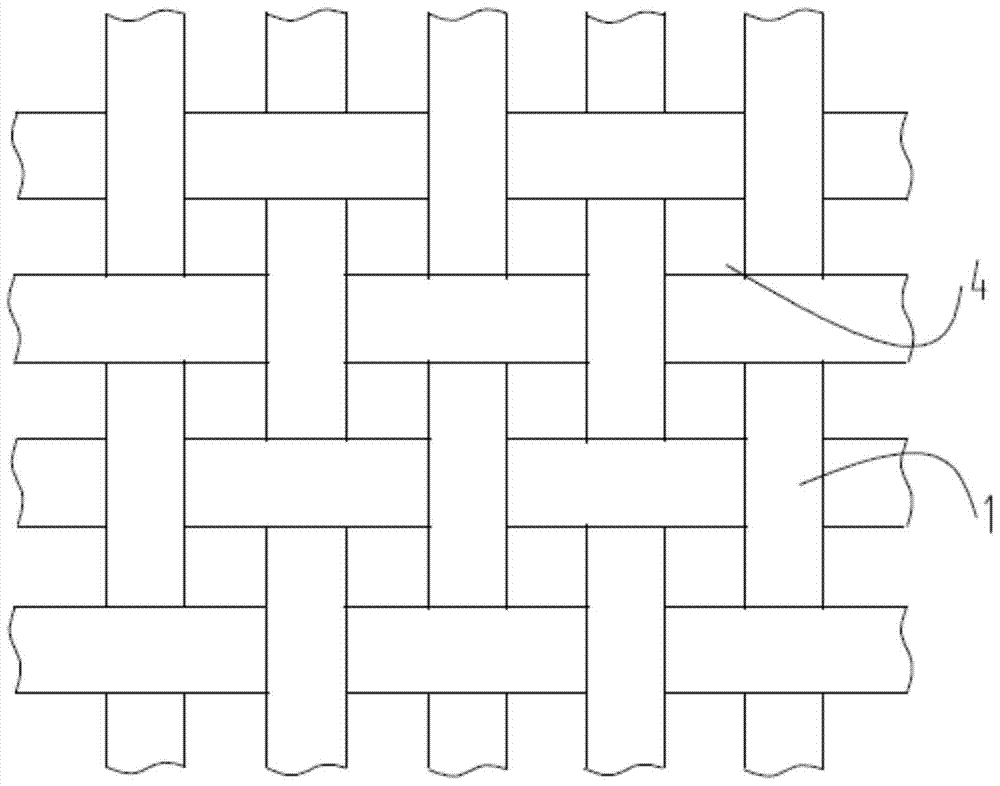New Textile Fabric
A textile fabric, a new type of technology, applied in textiles, textiles, papermaking, fabrics, etc., can solve problems such as low efficiency, and achieve the effects of enhanced heat storage function, enhanced thermal insulation performance, and convenient escape
- Summary
- Abstract
- Description
- Claims
- Application Information
AI Technical Summary
Problems solved by technology
Method used
Image
Examples
Embodiment 1
[0019] figure 1 It is a schematic diagram when the fabric is not deformed, figure 2 It is a schematic diagram of the fabric deformed by water, image 3 Schematic diagram of the structure of the core-spun yarn. Such as figure 1 , figure 2 with image 3 As shown, what this embodiment provides is a kind of novel textile fabric, and the yarn of described novel textile fabric is a kind of core-spun yarn 1, and yarn core part 2 is made up of a kind of functional fiber that is beneficial to dehumidification, and winding part 3 is made of A kind of functional fiber of heating and heat storage; the functional fiber of the temperature rising and heat storage is composed of 60 parts by weight of conventional fiber materials, 20 parts by weight of carbon black particles for pigments, and 20 parts by weight of carbon black particles. 20 parts of color masterbatches are formed by melt spinning; the functional fibers that are beneficial to dehumidification are formed by melt spinning ...
Embodiment 2
[0024] The difference between Embodiment 2 and Embodiment 1 is that: the functional fiber for heat storage of temperature rise consists of 80 parts by weight of conventional fiber materials, 15 parts by weight of carbon black particles for pigments, and 15 parts by weight of carbon black particles. The quantity is 5 parts of color masterbatch melt spinning; the twist number of the yarn core part 2 is 200T / m; the twist number of the winding part 3 is 200T / m.
Embodiment 3
[0026] The difference between Embodiment 3 and Embodiment 1 is that: the functional fibers for heat storage of temperature increase are composed of 70 parts by weight of conventional fiber materials, 18 parts by weight of carbon black particles for pigments, and parts by weight of The quantity is 12 parts of color masterbatch melt spinning; the twist number of the yarn core part 2 is 150T / m; the twist number of the winding part 3 is 150T / m.
PUM
 Login to View More
Login to View More Abstract
Description
Claims
Application Information
 Login to View More
Login to View More - R&D
- Intellectual Property
- Life Sciences
- Materials
- Tech Scout
- Unparalleled Data Quality
- Higher Quality Content
- 60% Fewer Hallucinations
Browse by: Latest US Patents, China's latest patents, Technical Efficacy Thesaurus, Application Domain, Technology Topic, Popular Technical Reports.
© 2025 PatSnap. All rights reserved.Legal|Privacy policy|Modern Slavery Act Transparency Statement|Sitemap|About US| Contact US: help@patsnap.com



